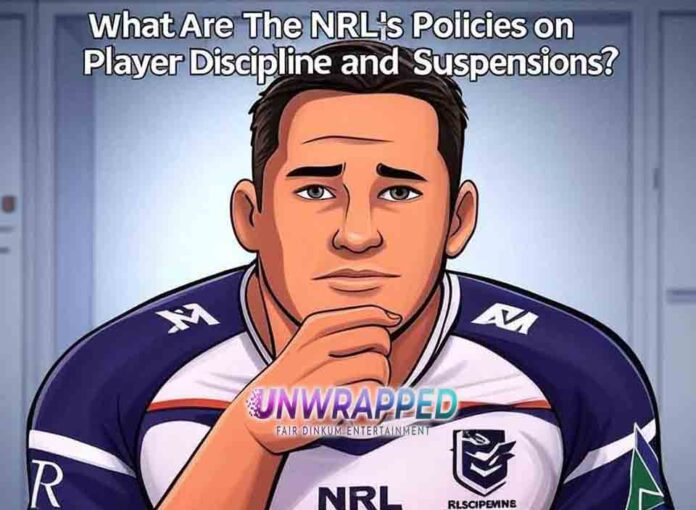The National Rugby League (NRL) has established comprehensive policies to uphold player discipline and manage suspensions, ensuring the integrity and fairness of the sport. These policies encompass both on-field and off-field conduct, with structured procedures to address various forms of misconduct. However, the implementation of these policies has not been without challenges, controversies, and debates within the rugby league community.
On-Field Disciplinary Procedures
The NRL’s on-field disciplinary framework is designed to address incidents that occur during matches, maintaining the sport’s integrity and player safety. This system primarily involves the Match Review Committee (MRC) and the Judiciary Panel.
- Match Review Committee (MRC)
After each game, the MRC reviews match footage to identify any incidents that may have breached the game’s rules. If a player is found to have committed an offense, the MRC assigns a charge with a specific grading, which determines the severity of the penalty. For example, offenses such as high tackles or dangerous throws are categorized into grades, each carrying corresponding fines or match suspensions.
- Judiciary Panel
Players charged by the MRC have the option to accept an early guilty plea, often resulting in a reduced penalty, or contest the charge before the Judiciary Panel. This panel, comprising former players and legal experts, conducts hearings to determine the outcome of contested charges. The Judiciary Code outlines specific penalties for various offenses, ensuring consistency and fairness in disciplinary actions.
Challenges and Controversies in On-Field Discipline
Despite the structured approach, the NRL’s on-field disciplinary system has faced criticism over perceived inconsistencies and controversies. For instance, the decision to allow players like Latrell Mitchell and Josh Addo-Carr to serve suspensions during the All Stars game, thereby reducing their unavailability for regular NRL matches, sparked significant debate. Critics argued that such decisions undermine the integrity of the suspension system and send mixed messages about accountability.
Additionally, the judiciary’s handling of high-profile cases has sometimes led to public outcry. For example, the suspension of Broncos player Ezra Mam for driving offenses was met with criticism, with commentators arguing that the punishment was too lenient and failed to set a strong precedent for player behavior.
Off-Field Disciplinary Policies
The NRL enforces strict policies to address off-field behavior, aiming to uphold the league’s reputation and ensure player accountability. The NRL Integrity Unit investigates allegations of misconduct, which can lead to fines, suspensions, or other sanctions. For instance, in cases involving illicit drug use, the NRL has a two-strike policy: the first offense may result in counseling and rehabilitation, while a second offense can lead to suspension or dismissal.
Challenges and Controversies in Off-Field Discipline
Off-field disciplinary actions have also been a source of controversy. The NRL’s “no-fault stand down” policy, which allows the league to stand down players charged with serious criminal offenses even before a verdict is reached, has been both praised for upholding the game’s integrity and criticized for potentially undermining the legal principle of “innocent until proven guilty.”
Furthermore, the league’s handling of off-field incidents has sometimes been perceived as inconsistent. The case of Corey Harawira-Naera and Jayden Okunbor, who were initially deregistered for breaching the league’s code of conduct but later had their punishments reduced upon appeal, highlighted challenges in balancing disciplinary actions with fairness and due process.
Recent Developments and Ongoing Challenges
The NRL continually reviews and updates its disciplinary policies to address emerging challenges. For example, the league has explored introducing a grading system for off-field incidents to ensure consistent and fair penalties.
Additionally, decisions regarding the timing of suspensions, such as allowing players to serve bans during representative matches like the All Stars game, have sparked debate within the rugby league community.
Conclusion
The NRL’s policies on player discipline and suspensions are integral to maintaining the sport’s integrity, fairness, and safety. Through a structured judiciary system, a comprehensive code of conduct, and proactive off-field disciplinary measures, the league strives to uphold high standards of behavior among all participants. Continuous evaluation and adaptation of these policies ensure that the NRL remains responsive to new challenges, fostering a positive environment for players, officials, and fans alike.
External High Authority Links
For more detailed information on the NRL’s disciplinary policies and procedures, you can refer to the following resources:
Call to Action
Understanding the NRL’s disciplinary policies is crucial for all stakeholders in the rugby league community. Stay informed and engaged by reviewing the official guidelines and participating in discussions about the league’s disciplinary processes. Your involvement helps promote a fair and enjoyable environment for everyone involved in the sport.











